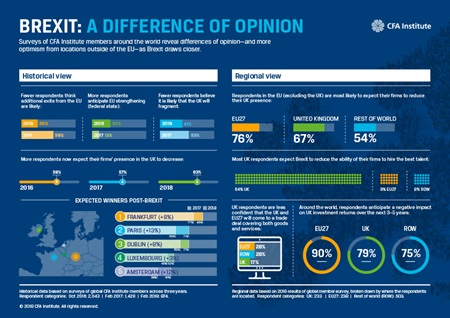Internationally, signs of optimism about a post-Brexit world, but costs from dislocation and challenging investment returns anticipated for the UK market: latest CFA Institute Brexit barometer reveals
-
Almost half of respondents globally expect Brexit negotiators to reach a trade deal
-
Negative impact on UK returns and ability of UK firms to hire best talent anticipated
-
No investor benefit imagined from potential restrictions on delegation arrangements
-
Paris the biggest mover among perceived Brexit winners, but Frankfurt still top
-
Sharp reduction in number of investment professionals expecting more EU exits
London, 21 March 2018: CFA Institute, the global association of investment professionals, today released the findings of its 2018 Brexit member survey, revealing the latest sentiment among investment professionals about the impact of Brexit on the asset management industry. The CFA Institute Brexit Survey reveals some signs of optimism about a post-Brexit world, but challenges for UK investment management are anticipated.
The latest survey reveals a degree of confidence among investment professionals that Brexit negotiations will end with a trade deal. Globally, almost half (49%) of investment management professionals responding to the survey expect Brexit negotiations to result in either a comprehensive trade deal covering both goods and services (25%), or a goods only deal (24%). Respondents outside of the EU were generally most optimistic, led by those in China, where 52% anticipate a comprehensive trade deal will be agreed. In the UK, 17% of respondents expect Brexit negotiations to deliver a comprehensive trade deal, with most (23%) expecting a goods only agreement. For respondents in Switzerland and Germany, the most likely outcome anticipated is a UK ‘crash-out’ EU exit (35% and 30%, respectively).
On UK market competitiveness, the survey highlights a modestly improved outlook on the part of UK investment professionals, with slightly fewer in this year’s survey believing that Brexit has caused a deterioration in the competitiveness of their home market (68%, down from 70% in 2017 and 74% in July 2016). Still, 64% of UK respondents expect Brexit to negatively impact their firm’s ability to attract the best talent, and 67% expect their firms to reduce their UK presence—this number rises to 76% of those polled in the EU (ex UK). The survey also reveals that 80% of respondents worldwide expect Brexit to negatively impact UK returns. This rises to 90% of EU (ex UK) respondents.
Most in the UK (51%) felt optimistic that the UK would maintain its regulatory alignment with the EU from a financial markets perspective. However, on the question of delegation restrictions (such as outsourcing of portfolio management), few either in the UK or globally considered the prospect as positive for investors: notably, respondents in China (52%) and the UK (49%) felt delegation restrictions would be negative for investor outcomes.
The survey results place Frankfurt as the most likely perceived winner from Brexit, followed by Paris, Dublin, Luxembourg and Amsterdam. Paris is the biggest mover, moving up from fourth place to joint-second, and Amsterdam’s ascent into the top five edges New York into sixth place.
Says Gary Baker, CFA, Managing Director EMEA and Industry and Policy Research, CFA Institute:
“What is powerful about this research is the body of opinion it provides from a large number of investment management professionals around the world, many of whom have no emotional investment in Brexit. While we see some signs of optimism, views of CFA Institute members vary between the markets, and much uncertainty remains over the likely outcome of the Brexit negotiations.”
Globally, a higher proportion of respondents think that EU strengthening is likely—34% compared with 13% in 2017—and far fewer respondents now anticipate more EU exits to follow the UK’s departure (30% down from 59%). Additionally, fewer imagine Brexit will spur UK fragmentation (41% down from 53%). However, uncertainty that Brexit will go ahead has risen: 15% of respondents now think it likely that Brexit will not happen—up from 5% in 2017.
Says Will Goodhart, Chief Executive, CFA Society UK:
“The emotional temperature as revealed in the latest CFA Institute Brexit survey is falling, but the most recent findings show considerable concern for the UK’s competitiveness as a financial centre. In light of the uncertainty over how the Brexit trade deal negotiations will play out, an increasing number of survey respondents in firms with a strong UK presence expect to see that presence reduce. Respondents, whether from the UK, EU or rest of the world, are also pretty clear that restricting delegation arrangements would have a negative effect on investor outcomes.”

For further information please contact Nicole Haroutunian, Director, Corporate Communications EMEA on +44 (0) 207 330-9551 or
Nicole.Haroutunian@cfainstitute.org.
About the survey
The survey was undertaken between 1 and 15 February 2018. 974 investment professionals completed the survey: 233 from the UK; 238 from other EU countries (excluding the UK); and 503 from the rest of the world. This survey follows an initial survey of 2,043 investment professionals taken between 13 and 21 July 2016 and a subsequent survey of 1,428 investment professionals taken between 6 and 13 February 2017.
To access previous CFA Institute Brexit surveys, please click here: 2017, 2016.

CFA Institute
CFA Institute is the global association of investment professionals that sets the standard for professional excellence and credentials. The organization is a champion for ethical behaviour in investment markets and a respected source of knowledge in the global financial community. Our aim is to create an environment where investors’ interests come first, markets function at their best, and economies grow. There are more than 150,000 CFA® charterholders worldwide in 165+ countries and regions. CFA Institute has eight offices worldwide and there are 151 local member societies. For more information, visit
www.cfainstitute.org or follow us on Twitter at @CFAInstitute and on Facebook.com/CFAInstitute.